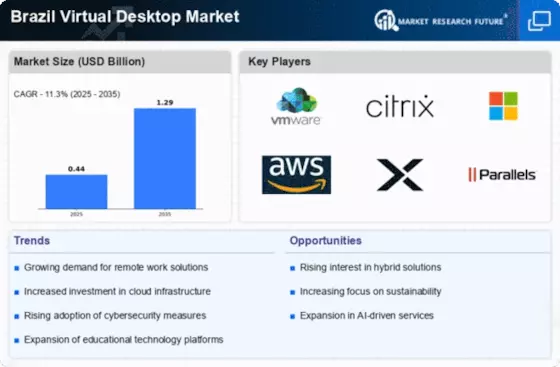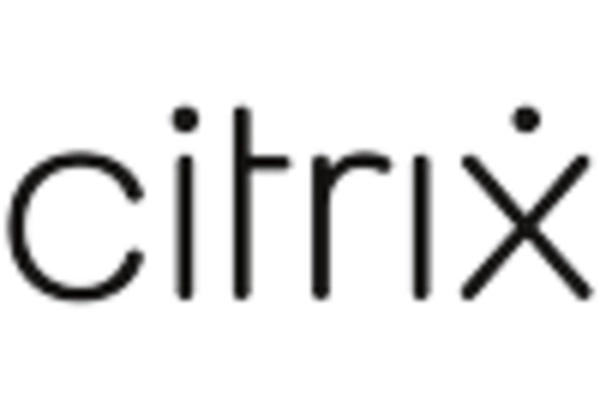Advancements in Cloud Technology
Advancements in cloud technology are significantly influencing the Brazil Virtual Desktop Market. The increasing availability of high-speed internet and improvements in cloud computing capabilities have made virtual desktops more accessible to a broader range of businesses. As cloud service providers enhance their offerings, organizations in Brazil are more inclined to adopt VDI solutions that leverage these advancements. The integration of artificial intelligence and machine learning into cloud platforms is also expected to enhance the performance and scalability of virtual desktops. This technological evolution may lead to a surge in demand for cloud-based virtual desktop solutions, positioning cloud advancements as a key driver in the growth of the virtual desktop market in Brazil.
Rising Demand for Remote Work Solutions
The Brazil Virtual Desktop Market is experiencing a notable increase in demand for remote work solutions. As organizations across various sectors seek to enhance productivity and flexibility, virtual desktop infrastructure (VDI) has emerged as a viable option. According to recent data, approximately 60% of Brazilian companies have adopted some form of remote work strategy, which has driven the need for robust virtual desktop solutions. This trend is likely to continue as businesses recognize the benefits of VDI in providing secure access to applications and data from any location. Furthermore, the Brazilian government's initiatives to promote digital transformation in the workplace are expected to further bolster the adoption of virtual desktops, making it a critical driver in the market.
Growing Interest in Cost-Effective IT Solutions
The Brazil Virtual Desktop Market is witnessing a growing interest in cost-effective IT solutions among businesses. Virtual desktops can significantly reduce hardware costs, as they allow organizations to utilize existing infrastructure more efficiently. Moreover, the operational expenses associated with maintaining physical desktops can be minimized through the adoption of VDI. Recent studies indicate that companies in Brazil can achieve up to 30% savings in IT costs by transitioning to virtual desktop solutions. This financial incentive is likely to attract more organizations to consider VDI as a strategic investment, thereby propelling the growth of the virtual desktop market in Brazil. As businesses continue to seek ways to optimize their IT budgets, this driver will play a crucial role in shaping market dynamics.
Increased Focus on Data Security and Compliance
In the Brazil Virtual Desktop Market, the emphasis on data security and compliance is becoming increasingly pronounced. With the rise of cyber threats and stringent regulations such as the General Data Protection Law (LGPD), organizations are compelled to adopt secure virtual desktop solutions. VDI offers enhanced security features, including centralized data management and access controls, which are essential for compliance with local regulations. As businesses prioritize safeguarding sensitive information, the demand for secure virtual desktop environments is expected to rise. This focus on security not only protects organizations from potential breaches but also fosters trust among clients and stakeholders, thereby driving the growth of the virtual desktop market in Brazil.
Government Initiatives Supporting Digital Transformation
The Brazilian government has been actively promoting digital transformation across various industries, which significantly impacts the Brazil Virtual Desktop Market. Initiatives such as the National Digital Transformation Strategy aim to enhance the country's technological infrastructure and encourage the adoption of innovative solutions. This governmental support is likely to create a conducive environment for the growth of virtual desktop solutions, as organizations are incentivized to modernize their IT infrastructure. Additionally, public sector entities are increasingly implementing VDI to improve service delivery and operational efficiency. The potential for government contracts and partnerships in the virtual desktop space may further stimulate market growth, making it a pivotal driver in the industry.















